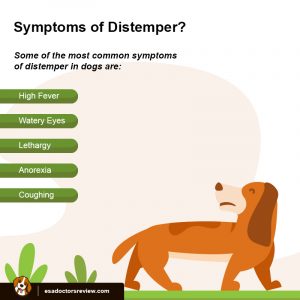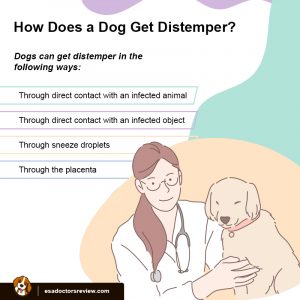Distemper can leave your dog in a poor state, causing uncomfortable symptoms such as sneezing and seizures. Since it occurs because of a virus, distemper in dogs has no known cure, and it could lead to death. It would seem the best way to manage distemper in dogs is to go natural, but before investigating further, distemper in dogs, what is it?
Find out ahead how you can treat distemper in dogs. But before that, read reviews about ESA clinics.
What is Distemper?
It is a serious disease brought about by the Canine Distemper Virus (CDV), which attacks a dog’s gastrointestinal, respiratory, and nervous systems.
In the domestic setting, the virus is most prevalent in dogs, but it mostly infects puppies. Although you can find distemper in dogs and cats, felines do not show symptoms of the virus, so there is a chance they might be carriers.
CDV can affect wild animals, such as ferrets, raccoons, coyotes, wolves, skunks, lions, tigers, and even seals.
How Does a Dog Get Distemper?
Distemper in dogs spreads through sneeze droplets traveling in the air, or through fresh body fluids, like the poo, pee, or licking of an infected dog. The virus can spread through shared equipment like food and water bowls. Further, an infected dog can pass it to its puppies through the placenta.
An outbreak in wild animals that live near your home may spread to your dogs.
Symptoms and Treatments of Distemper In Dogs
The disease has a wide range of signs and symptoms. You must catch the distemper in dogs diagnosis early since the mortality rate is relatively high if not managed promptly.
-
Symptoms
1. Distemper in dogs eyes will display through secretions and discharge
2. Lethargy and loss of appetite
3. Vomiting and diarrhea
4. Coughing and labored breathing
5. Hardening of nose and footpad
6. Distemper in dogs teeth leads to little or no enamel in permanent teeth

Neurological issues that may occur include:
1. Trembling
2. Can’t walk properly
3. Muscle twitches
4. Weakness or paralysis
5. Uncoordinated movement
6. Highly sensitive to touch and pain
7. Seizures
-
Conventional Treatment
Treating a pup with the distemper virus is not for the faint-hearted since treatment can run into the thousands of dollars. All the while, the infected dog will still be infectious, so most people would sooner put the dog down rather than risk infecting the others.
As with any virus, distemper technically has no cure, so your always-reliable antibiotics won’t lay a glove on the illness.
All you can do is boost your pet’s resistance and hope it builds up enough immunity to shrug off the virus eventually. Keeping the dog strong and healthy does help in the process, as weakened dogs will not survive.
Can a dog recover from distemper? Find out ahead but before that, read reviews about the best ESA clinic.
The best way to manage distemper is by giving your dog medication to deal with the symptoms. For instance, you can administer:
1. Subcutaneous fluids to combat dehydration
2. Medication for diarrhea and vomiting
3. Anticonvulsants in case it gets seizures
4. Antibiotics for secondary infections and pneumonia
Prevention against distemper is better than cure. The distemper in dogs vaccine was released in the 1950s; there is no excuse to skip prevention.
Be sure to get the distemper shot in dogs as scheduled for it to be most effective. That means starting the vaccine at 6 weeks and administering follow-up vaccinations until 16 weeks.
There is little chance of distemper in dogs after vaccination, but your dog should get another shot a year later or as recommended by your vet.
Until they are through with the first batch of vaccinations (16 weeks), you should limit the pup’s interaction with other dogs. This will prevent exposure to the virus.
Neurological symptoms are much harder to cure and may worsen even with treatment. Even if the puppy recovers, there is a chance you will see some neurological effects persist.
How to Treat Distemper in Dogs Naturally?
As there is no conventional treatment for the distemper virus, it is tempting to try alternative medicines. Distemper in dogs treatment at home bears no guarantee that it will work, but the natural remedies will not have adverse side effects.
If there are other dogs in the house, it would be wise to isolate the puppy and vaccinate the others. Disinfecting the spaces the dogs normally frequent would not be out of place.

Following a natural course of treating distemper in dogs will typically involve:
1. A healthy, natural diet free from commercial pet food
2. Exercise
3. Healthy weight range
4. Vitamin supplements (A, C, and E)
5. Antioxidants
Using the natural herbs and supplements listed below could greatly improve your dog’s chances of making it through the distemper illness. Most of them contain powerful antiviral, antifungal, and antibacterial properties that will fight off secondary infections that ride on the destruction created by the virus.
The herbs and supplements include:
- Olive leaf extract
- Licorice root
- Ginger
- Neem
- Green tea
- Lemon balm
- Aloe vera
Additionally, you can incorporate these foods that have high antiviral properties, whether in their fresh or dehydrated form:
- Apples
- Spinach
- Kale
- Citrus fruit
- Tomatoes
- Seaweed and algae
- Yogurt with active cultures
Further, some vets provide alternative medicines. They would normally recommend supplements that manage the stages, signs, and symptoms of distemper, such as:
1. Diarrhea
A clay with Antidiarrheal properties to absorb toxins
2. Vomiting and Diarrhea
Electrolyte to replace the fluids
3. Sneezing Stage
A remedy prepared from sea salt (natrum muriaticum)
4. Conjunctivitis
Extracts from the pulsatilla/pasque flower plant
5. Sudden Inflammatory Conditions
Extracts from the root of the aconite/wolf’s bane plant
6. Advanced Distemper
Dilute aqueous arsenic trioxide or root of the goldenseal plant
7. Recovery Stage
Alcoholic extract of pus, scabies, and slough cells (psorinum)
8. Neuropathy Effects
B complex vitamins
Can a Dog Recover From Distemper?
If you do not treat your dog, it will not survive a distemper attack. So yes, a dog can survive distemper, but only if it receives proper care. However, it is a tough disease to treat, with some dogs suffering some effects of the disease even after recovery, while others will die even while undergoing treatment.
How Long Can Dogs Live With Distemper?
That depends on the strain of the virus and the dog’s immune system. With a weak strain and a strong immune system, the virus can clear up as early as 10 days. A more severe strain can remain in the dog for more than 90 days before it is no longer contagious.
Can Distemper In Dogs Affect Humans?
Fortunately, distemper is not a zoonotic disease; that is, it does not infect dogs and humans. Some humans have caught the CDV infection in rare cases, but they did not display any symptoms even then.
As the CDV has close relations to measles, you are immune to the CDV and CDV infection once you get a measles vaccine.
Don’t forget to read reviews about authentic ESA letter providers.
To conclude, distemper mostly affects puppies and can be fatal if not taken care of. It causes symptoms such as vomiting, hardening of the footpad, and seizures. Thankfully, there are effective natural treatments for distemper that involve alternative medicines, exercising, herbs, and supplements.
If your dog shows distemper symptoms, it is highly recommended that you seek a reputable vet’s advice.
Contact ESA Doctors Review today to get meaningful connections to the best veterinary health providers. Don’t forget to read reviews before you go!








